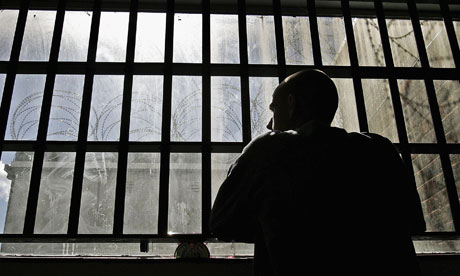Britain has been warned it has less than two months to take “concrete” measures towards allowing prisoners the right to vote, in a key test for David Cameron.
7:00AM BST 29 Sep 2012
The body that runs the European Court of Human Rights said it was “almost
seven years” since the blanket ban was ruled illegal, and that time was
running out for Parliament to take action.
It puts renewed pressure on the Prime Minister, who famously said the thought
of letting inmates take part in elections made him “physically ill”.
He must decide if he should declare that Parliament has already rejected the
proposal, which would please Conservative backbenchers but would trigger
compensation claims from disenfranchised prisoners as well as the threat of
fines from Strasbourg.
Mr Cameron will also be encouraged by Liberal Democrats in the Coalition, who
believe some prisoners should be given the vote, to comply with the order
from Strasbourg.
Dominic Raab, a Conservative backbencher who sits on the Joint Committee on
Human Rights, said: “The Prime Minister has made clear that Britain will
stand firm and defend our democratic prerogatives.
“There is no right for prisoners to vote in the European Convention, and
Strasbourg can’t enforce this perverse ruling.
“The European judges are gearing up for a constitutional showdown with Parliament that they will lose.”
Charlie Elphicke, the Tory MP for Dover and Deal, added: “If the Government holds firm and stands up for Britain they will have the full support of Parliament and the people. We should not allow European judges or the Council of Europe to bully us into submission.”
Britain was first told by the ECHR that its blanket ban on prisoners voting breached their human rights in October 2005, in a case brought by a convicted axe-killer, John Hirst.
Ministers attempted to avoid implementing the ruling but after Government lawyers were told it could cost millions in compensation claims, Mr Cameron reluctantly agreed that something had to be done.
It was suggested that only those sentenced to less than a year behind bars would qualify, but when the matter was put to the Commons in a non-binding vote in February 2011, MPs overwhelmingly agreed to keep the ban.
Later that year the Government was allowed to delay its decision until six months after European judges’ ruling in a similar case from Italy, known as Scoppola.
That judgment was delivered on May 22nd this year, starting the clock ticking again.
Mr Cameron indicated soon afterwards that he did not want to back down, telling the Commons: “Parliament has made its decision and I completely agree with it.”
But he received another warning from Europe on Friday.
A three-day meeting of deputies of the Committee of Ministers at the Council of Europe, the 47-state body that oversees the human rights court, considered the Hirst case alongside other outstanding judgments against governments.
Minutes of the meeting state that the deputies “recalled that the question of voting rights of convicted prisoners in prison has been pending before the Committee of Ministers since it began supervising the execution of the judgment in Hirst No. 2 against United Kingdom, namely almost seven years”.
They also “noted that the Grand Chamber delivered its judgment in Scoppola No. 3 against Italy on 22 May 2012 and that consequently, the United Kingdom authorities have until 23 November 2012 to comply with the pilot judgment”.
And the deputies “called upon the United Kingdom authorities to take the concrete measures necessary to comply with the pilot judgment within the new deadline set by the Court and invited them to keep the Committee regularly informed of developments in this respect”.
A Cabinet Office spokesman said: “The Government is considering how best to proceed following the judgment of the Grand Chamber of the European Court of Human Rights in Scoppola.”
Comment: I will respond to this article in due course.
“The European judges are gearing up for a constitutional showdown with Parliament that they will lose.”
Charlie Elphicke, the Tory MP for Dover and Deal, added: “If the Government holds firm and stands up for Britain they will have the full support of Parliament and the people. We should not allow European judges or the Council of Europe to bully us into submission.”
Britain was first told by the ECHR that its blanket ban on prisoners voting breached their human rights in October 2005, in a case brought by a convicted axe-killer, John Hirst.
Ministers attempted to avoid implementing the ruling but after Government lawyers were told it could cost millions in compensation claims, Mr Cameron reluctantly agreed that something had to be done.
It was suggested that only those sentenced to less than a year behind bars would qualify, but when the matter was put to the Commons in a non-binding vote in February 2011, MPs overwhelmingly agreed to keep the ban.
Later that year the Government was allowed to delay its decision until six months after European judges’ ruling in a similar case from Italy, known as Scoppola.
That judgment was delivered on May 22nd this year, starting the clock ticking again.
Mr Cameron indicated soon afterwards that he did not want to back down, telling the Commons: “Parliament has made its decision and I completely agree with it.”
But he received another warning from Europe on Friday.
A three-day meeting of deputies of the Committee of Ministers at the Council of Europe, the 47-state body that oversees the human rights court, considered the Hirst case alongside other outstanding judgments against governments.
Minutes of the meeting state that the deputies “recalled that the question of voting rights of convicted prisoners in prison has been pending before the Committee of Ministers since it began supervising the execution of the judgment in Hirst No. 2 against United Kingdom, namely almost seven years”.
They also “noted that the Grand Chamber delivered its judgment in Scoppola No. 3 against Italy on 22 May 2012 and that consequently, the United Kingdom authorities have until 23 November 2012 to comply with the pilot judgment”.
And the deputies “called upon the United Kingdom authorities to take the concrete measures necessary to comply with the pilot judgment within the new deadline set by the Court and invited them to keep the Committee regularly informed of developments in this respect”.
A Cabinet Office spokesman said: “The Government is considering how best to proceed following the judgment of the Grand Chamber of the European Court of Human Rights in Scoppola.”
Comment: I will respond to this article in due course.









 By Mark Tallentire
By Mark Tallentire


 Enduring
the rigours of the world behind prison walls has always been a
gruelling experience and an unremitting struggle to survive, but for the
lifer with an uncertain future the battle to survive is even more
testing and he/she will be left with only the mechanism of hope to
overcome the forces of despair and uncertainty.
Enduring
the rigours of the world behind prison walls has always been a
gruelling experience and an unremitting struggle to survive, but for the
lifer with an uncertain future the battle to survive is even more
testing and he/she will be left with only the mechanism of hope to
overcome the forces of despair and uncertainty.
